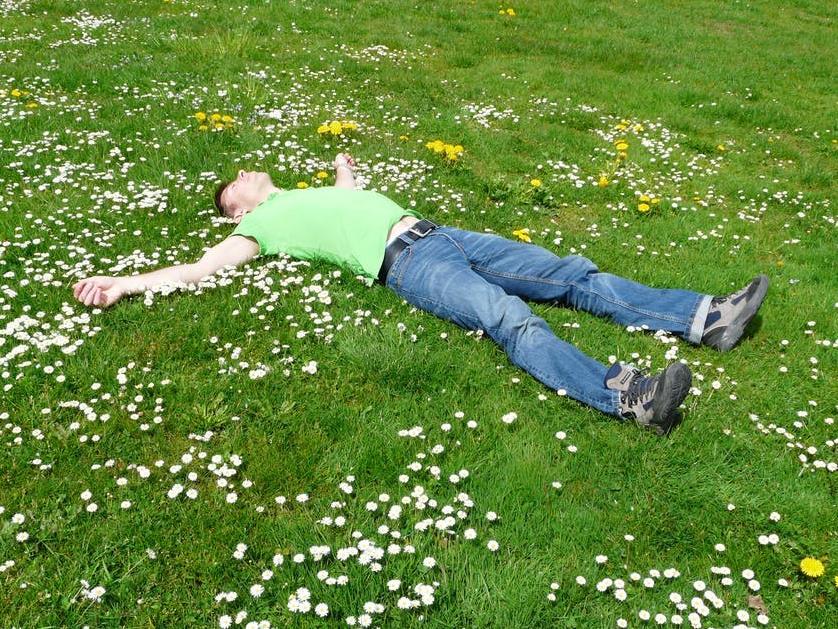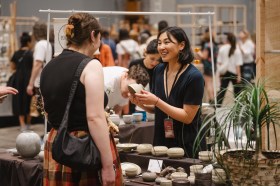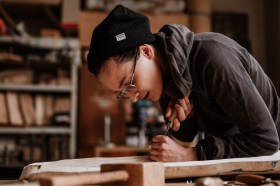Image: pexels.com
Be it over the course of our careers in the arts, or even our day-to-day creative practice, it’s natural to experience periods of creative lull.
We may struggle to formulate a new idea, take a project through to the next step, or maintain confidence in our work and practice.
When in the thick of such a time, many of us fail to acknowledge that it’s temporary. Instead, we may convince ourselves that this lull is a signal that our ideas have officially run dry, or our careers have no foreseeable future. We’re not good enough, we’ve maxed out our creative potential, we are stuck.
But instead of taking our own creative lulls personally, we can learn to
‘Creative lulls serve many purposes, and that’s why they are so common. Some lulls are about maintaining and restoring the physical and psychological energy needed to be active, creatively,’ explained Sarah Darmody, author and founding faculty member at The School of Life Australia.
‘Our brains need rest and creative lulls to in order to tinker around with spare parts and connect them.’
Simply, creative practice and working in the arts is difficult and you’re not a failure for simply experiencing the natural side effects of the work. ‘It feels hard because it’s really hard,’ added Darmody. ‘We live in a society that glorifies some kinds of creative output, with lots of associated pressure, but also ignores, punishes and derides the very parts of the creative process that lead to novelty and brilliance.’
For some, creative lulls stir a certain dread or terror that spurs them into action. ‘I think creative lulls are designed to terrify you into being creative again,’ puppeteer,
For others, they provide a moment to reflect and procrastinate. ‘I think when you’re in a creative lull, you are more open to new input and ideas. Before you know it, procrastinating on the internet has planted a little seed that could blossom later,’ said Jeroen Smeets, art agent and founder of The Jaunt.
Lulls or blocks can also be a warning sign. ‘I think our lulls can be the body and the mind’s way of telling us we are approaching
‘Or alternatively, creative lulls can sometimes be an indication that we need to assess the situation from a different perspective, or rethink our methods and practices, and refine our approach. Plants lie dormant in between spates of abundant flowering,’ Mama Alto added.
Artist Jasmine Mansbridge has
Whichever variety of lull you’re experiencing, there are various strategies that can help you move through them, while not beating yourself up in the process.
‘I think that all the situations have specific challenges, but there are things you can do in each instance to help you move more quickly through a flat period,’ explained Mansbridge.
Performers, writers,
45 ways to spot, overcome and even enjoy a creative lull
1. Don’t be afraid to do what you want to do
‘Let go of what you think you need to be doing to be taken seriously as an artist, because really, who do you want to really be taken seriously by? Once I decided to start dance classes at a nightclub, some people would tell me that it would make it hard to then make a name as a contemporary dancer. But if I get known for doing the classes and for making people happy and being able to pack out a room, that would be a really great thing to be known for! So let go of what you think is the serious or right way to do something. This is the time to take a fucking risk.’ – Amrita Hepi, dance maker.
2. Have a change of scenery
‘I try to change my surrounds and put myself in uncomfortable situations when I need to jump-start my creativity. To write this year’s Melbourne Fringe
3. Create chaos around you
‘If I have a personal breakthrough or something shifts in my everyday life, it tends to end up in my work. And if nothing is shifting in my life and I have a deadline looming I randomly select a friend, partner or family member and create some chaos around them to generate some creative fodder.’ – Heath McIvor.
4. Ask, what would you rather be doing?
‘Ask yourself if you’d rather be doing something else. If the answer is yes, get out while the going is good. If the answer is no, get back to work.’ – Heath McIvor.
5. Recognise your own creative cycle
‘What I’ve learned about myself over the years is that the projects that I work on have their own creative cycle. I’m really enjoying the creative energy in the start of a project, trying to make it work, introducing people
6. One thing leads to another
‘I was once on a trip
7. You should only worry if you’re never in a lull
‘Challenges, blocks, procrastination, and lulls are very much part of the day-to-day creative process. I’d be worried or
8. Focus on the process
‘We are such an outcome-driven society, with little patience for or interest in the long, awkward and often meandering route that artists must take to get to the point where they can share their work with others …You can learn to take pride in and identify with the act of doing and making, rather than the having, publishing, and showing, which are the smallest, least creative parts of the process but the parts we give the most psychological attention to.’ – Sarah Darmody, author.
9. Remember you’ll have a good day again
‘If I have a bad day with writing a book, the more my confidence grows, the more I can trust that I’d have a good one again and keep writing towards that good day.’ – Sarah Darmody.
10. Create an ‘evidence locker’
‘I used to imagine each good paragraph or fresh idea as the evidence file in a police case – every good session was added to the file of “can write” and “this is working.” At the end, the evidence drawer had become a locker, and now there’s an evidence room for me to check through. I needed proof of my ability to overcome creative hurdles and to entertain or surprise myself. The point at which proof overtakes hope is a lovely one, but it can take a long time to get to. Trusting that is very helpful.’ – Sarah Darmody.
11. Start small
‘Crafting small experiments for ourselves is a great start in dealing with blocks and confusion, but the key is to keep these experiments small and achievable. Don’t write notes commanding yourself to “find
12. Keep calm in the face of a lull
‘Understanding that no matter what we choose to do, we’re naturally going to end up with some blocks and lulls and dissatisfaction is a good way to stay calm about those blocks and look for a sensible way out. You can crawl through an open window or find a spare key for a door, you don’t always need to blow up a wall to get out, but panic will tell you otherwise.’ – Sarah Darmody.
13. You don’t need to create a product for something to be valuable
‘Take some comfort in knowing that you’re alive at a time and place in history where dedicated creative thought is still so important to the collective human experience but that the leisure time, whimsy, thrift and non-competitive collaboration required to fuel a creative life are deeply at odds with our current
14. Use the lull to examine the project
‘A hesitation or lull is in my experience a part of the process – it generally means something’s not right in the story or form or process of working and the work is telling you to get it right. It’s a good sign because it helps whittle down what something is by eliminating a lot of things it is not.’ – Chris Isaacs, playwright.
15. Do the bit you can
‘I was stuck on a scene once and had rung up Kate Mulvany to give me a hand, push me through it so to speak, she said “Do you know what happens after this scene you’re stuck on?” and I said “Yeah I do. I can’t wait to get to it.” So she said, “Then write that scene, you can always go back and rewrite the scene in
16. Embrace doing something badly
‘Learning that the writing will be bad before it is good is helpful. Knowing it’s all disposable and actors, directors, designers etc are going to be looking at it with a curating eye anyway is probably the most helpful.’ – Chris Isaacs.
17. Recognise your work needs time
‘Stephen King has a line that I love which is “The Book is Boss”. You’re not in charge of your play, it’s in charge of you. You can’t make it be something it is not, so if you’re in a lull it’s probably because the play and you need time to figure out what it is. And if it is easy and the play comes in one whirlwind burst then so be it. Don’t stop there though… work it and rework it to make it better.’ – Chris Isaacs.
18. The only person you have to prove anything to is yourself
‘It’s not unusual, it’s not uncommon, to feel blocked. Perhaps the best thing to
19. There will be times in our lives other things require our focus
‘I had a
‘But lulls give you the chance to focus on other areas of life, like relationships with friends and family, health, earning/saving money,
20. Gradually make changes
‘I gradually made changes in my life, where I could, to work on my general well-being. I did a lot of self-assessment trying to work out how I could fix things. I moved house. I quit the job that was sucking out my soul, which was followed by a stressful period of unemployment. I’m still working it out. It’s hard, uncertain, confusing, and ongoing.’ –
21. Try to maintain perspective
‘I try to maintain perspective on it, which is very hard to do when you’re in one. There are a lot of external expectations for being an art practitioner, like high volumes of production and frequency of exhibition, and a lot of importance placed on constant creative success. When you’re in a slow patch these ideas can be really damaging. I try to remember that everyone works differently, in their own time, at their own pace, and try not to beat myself up because my pace is slower.’ –
22. Watch Oprah
‘I have
23. Ride the highs and lows
‘Over the years I have
24. Create a protective bubble
‘I have
25. Freshen up
‘Not only is it natural to experience challenges, blocks, indecisiveness, and lulls it’s a certainty, and if
26. Allow yourself to feel rejection
‘Every time I am rejected from a festival or venue, or similar opportunity, I face an immense lull. My confidence is undermined, my sense of the viability and sustainability of my career disappears, my motivation plummets, my anxieties skyrocket. There’s a real sense of worthlessness: it feels as
27. Go where the love is
‘I will listen to the little voice inside that says “go where the love is” – and continue taking my work to the venues, festivals, audiences, colleagues and collaborators who appreciate and support what I do. I’ll then bolster my sense of faith in my art by revisiting old reviews, accolades and audience responses, which will have me feeling better enough to begin thinking rationally and dispassionately about each rejection: a place where I can see that venues and festivals have certain restrictions, certain agendas, certain budgets, certain logistics, and other realities and circumstances, behind their decisions. A rejection doesn’t mean my art is worthless – a failure is a bruise, not a tattoo.’ – Mama Alto.
28. Avoid comparing yourself
‘I think the breakthrough came when I accepted that, artistically, there is no point in comparing yourself and your art to others, and there is no point in trying to compete with anyone. That is a futile, miserable and frustrating path. I
29. Go back to the ‘why’
‘Why do I, why do we, make art? For me, this is how art is about people and stories and emotions, and what music can do in people’s lives. Focusing on the “why” can motivate us to pick ourselves up, dust ourselves off and start again.’ – Mama Alto.
30. Seek advice from those you trust
‘This is not just those in the arts or creative sectors, but anyone with a work ethic, practice, or career you admire. And it’s not just advice from those you know, given directly to you in conversation, but seek advice and inspiration in books, online, anywhere where ideas are communicated.’ – Mama Alto.
31. Fill up the tank
‘Soak up other arts and media to feed your soul and your creative mind. Movies, theatre, books, music, art galleries, online or in person – soak it all up. It’ll do you good. But never think about competition or comparison – only compete against yourself.’ – Mama Alto.
32. Rethink self-care
‘Creative lulls, artistic blocks and career confusion can be the result of, or the cause of, depression and anxiety – so my advice would also to be engaging in self-care practices. The concept of self-care is an interesting one, and one which is often very controversial and can be clouded by our own subjective positions and privileges when it comes to class, gender and race – so we must be mindful of the fact that what might be perceived as self-care to some is actually a luxury to others. When overwhelmed or exhausted, or when in a negative mental health place, my self-care and unwinding comes down to essential tasks, such as hot showers, and luxuries such as moisturising, temporarily logging off or unplugging from media coverage of hate speech or
33. Learn from mistakes
‘I procrastinate terribly. Which is awful, and particularly tricky to tackle when I’m working on scripts I’ve written
34. Seek external accountability
‘I procrastinate because I am terrified of acting, even now, I resist the vulnerability and physicality of it. I also find scheduling acting coaches or voice coaches to work with me on particular sections helps me to focus and gets me there.’ – Emma Mary Hall.
35. Trust the back-brain
‘Keep breathing, keep sleeping, trust that the back brain is working on your creations, and nurture the generous within you. Give yourself some
36. Know when you need to kick-start the process
‘I’ve gone through periods of months and even years where I barely picked up a guitar and felt really uninspired to write or create anything.
37. Don’t be fooled by expectations
‘It sounds obvious, but
38. See overcommitting as the enemy
‘The two greatest challenges I face on a consistent basis are
39. Build routine into your calendar
‘Keeping a physical calendar and adding some routine into my life has been really helpful in dealing with overcommitment.’ – Jeremy Neale.
40. Ask for help
‘I made a really conscious effort to try and get comfortable with the idea by asking so many people to help with different aspects of the creation of my new album and its associated assets (film clips, artwork etc). At the end of the day though, I find I still need to remind myself that I’m very willing to help other people with their creative pursuits so there’s hopefully a good chance that the same is true for them.’ – Jeremy Neale.
41. Read
‘I’ve started to read more broadly, and listen to opinions of those I disagree with; sometimes to inspire a thought I’ve never had before, sometimes to get my rage fire going to I can write some sweet, angry music. I try to listen to a podcast a day, so I have fresh opinions flying into my head.’ – Alice Tovey,
42. Back yourself
‘You have to back yourself and your creative instincts no matter what everyone around you thinks. Some of your early work won’t hit the mark you’re aiming for, but you just have to keep moving ahead. A creative career can feel like endlessly pushing a rock up a hill, but that rock is your rock and no one else’s, and that is a satisfying thing.’ – Julie Koh,
43. Careers can be twisting, turning waterslides
‘My career shifted in an unexpected way after the publication of my first full-length book. The book’s done really well but because my energy for so many years had been directed towards the goal of just getting that book published, I hadn’t really thought about what would come after. Or, more accurately, I thought that everything after publication would be a walk in the park. But it hasn’t been – it’s been a twisting, turning waterslide. It’s been like starting a new job in an area I haven’t been trained for, and trying to keep up.’ – Julie Koh.
44. Go back to, what do you enjoy doing? (Hint: it can be Netflix!)
‘A friend of mine recently listened to me rant about my lull and said: ‘So what do you actually enjoy doing?’ And I couldn’t give him an answer because I’d been working so hard in recent years. His advice was to spend some of my time doing things I actually want to do. So I’ve been going to public lectures in various
45. Know a creative lull is not creative death
‘I don’t think anyone likes creative lulls, mostly because you’re likely to mistake a creative lull for creative death. The worry is always that you’ll never get back to peak creativity – that your best days are either behind





